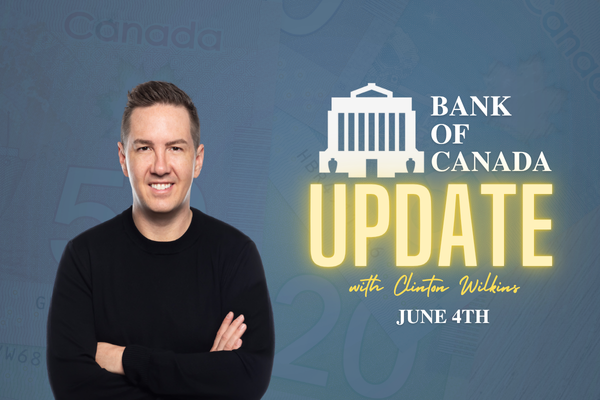Clinton Wilkins joins Todd Veinotte on 95.7 News Radio to discuss The Bank of Canada holding its key policy rate at 2.75%, marking the first pause after seven consecutive cuts.

CityNews – Mortgage Rates Softening Report | Jan 3, 2024
Clinton Wilkins joins Rob Snow on CityNews to discuss the state of mortgage rates ahead of the next Bank Of Canada Update. They discuss where the rates are currently, fixed vs variable rate options, and rate predictions in the coming months.
Are we in a plateau and can we expect rates to soften? Tune in to find out.
Clinton Wilkins 00:00
You’re listening to Mortgage 101, your guide to homeownership with Clinton Wilkins and myself Todd Veinotte.
Clinton Wilkins here. You’re listening to a special report.
Rob Snow 00:14
As we start a brand new year, Clinton Wilkins is back with the Clinton Wilkins mortgage team, Centum Home Lenders in Dartmouth.
Hi, Clinton.
Clinton Wilkins 00:26
Thanks for having me, Rob, How’s your new year starting?
Rob Snow 00:29
Everything is good so far, because I don’t set new year’s resolutions. And 2023 was the year I renewed my mortgage. So that’s over and done with. I got that pain out of the way in 2023.
Clinton Wilkins 00:45
Hopefully there’ll be less pain in 2024.
WHAT’S AHEAD FOR US IN 2024?
Rob Snow 00:49
Yeah, let’s hope so. So what’s the trend right now, with mortgage rates?
Clinton Wilkins 00:56
The trend is definitely and we’re in a plateau type situation, Rob. I think in 2024, we’re going to see rates start softening. We saw that late in 2023, there was really some downward pressure on the bond yields. And we saw some softening in the fixed rate products. So I definitely think consumers will start seeing some of the lower rates. Now, I can tell you a lot of the rates. You know, before the last few weeks, you know, we’re starting with six and into the sevens. I saw some clients bring renewals in from their existing lenders that even had a rate that started with an eight, which I think shocked some people.
But today, a lot of the approvals that we’re getting, the rates are in the 5% range. And I suspect in the coming weeks and weeks and months, we’re going to start seeing some rates and rate products that are going to start with a four. So I think that’s good news. I think this plateau is going to continue probably for the next six months or so. And I think by the summertime, a lot of economists, a lot of people in the industry think that the rates are going to start softening. The challenge is when the rates are going to start softening. I think that’s going to put a little bit of fuel on the housing market, which we know across this country has been very strained due to the amount of demand and the lack of supply. And a lot of people ask me that, like, you know, what should we do right now? And, and you know, it’s really tough not having that crystal ball. But I can tell you certainly the trend is still in a shorter term, fixed rate products. And there’s certainly been more borrowers choosing to do a variable rate.
FIXED VS VARIABLE RATE MORTGAGES – WHICH IS BETTER THIS YEAR?
Rob Snow 02:27
Oh, really, that’s very interesting. So what rates are lower fixed rates or variable rates,
Clinton Wilkins 02:33
The fixed rates are lower. And I think the one thing that you need to take into consideration is the length of the term. Historically, Canadians love taking a five year fixed rate, that’s, you know, over 60% of mortgages are in a five year fixed. That’s not necessarily the right thing for everyone right now. I will say we’re still doing mortgages and a five year fixed. Some borrowers need to take that mortgage, because that’s the only rate that they qualify for. But I think the savvy borrowers these days, and I can say the bulk of the mortgage that we’re doing right now or a three year fixed. And there’s certainly a lot more inquiries coming in with a variable.
Rob Snow 03:13
Okay, and on variable rates, variable rates being higher than than fixed rates, you said, right,
Clinton Wilkins 03:20
That’s right. Yeah, they’re significantly higher, a good variable rate today, on a high ratio insured purchase, or maybe an insurable transfer and insured transfer, you’re looking at a rate of somewhere around prime minus 90 basis points. So that’s a rate today at 6.3% were the same type of rate and a five year fixed, we’re looking in the low fives. So there’s more than 1% difference between where the fixed rate and where the variable would be. But some of the reasons why someone would take a variable is they expect the Bank of Canada to reduce the key overnight rate, maybe starting this year, I think it’s going to be a low and slow burn and the way down, they’re expecting the rates are going to soften. The other reason why someone may take a variable rate is typically it has the lowest penalty to exit the term early. So it may be a penalty of only three months interest to exit the term. And the other thing is, variable rates are often convertible. So you can convert it into a fixed rate down the road when the rates really do start softening that variable could be converted into a fixed.
Rob Snow 04:24
But again, your timeline, say for when that spread between the fixed rate and the variable rates would start to narrow. What are you looking at there? Clinton, what do you expect to happen?
Clinton Wilkins 04:37
I think we’re six months plus, honestly, and it may be longer, especially once we’re seeing the bond market. And there’s quite a spread between where the bonds are and even where the fixed rates are now, so, you know, we’re seeing lenders, you know, even at the end of the year, everything was kind of we’ll call it going on sale. Is it going on sale at 5%? Well, five percents a lot lower than 6%. We’re starting to see that type of softening. And I think we’re gonna see that type of softening here going into the spring, I think the summer is really going to be more of a telltale on what the rate environment is going to look like for the rest of the year.
Rob Snow 05:13
Okay, so just let me ask you, I mean, I sometimes ask people in real estate, I just asked him, how’s business? How’s business? I mean, is it? Is it busy? Is it a little on the slow side? What’s business normally like, in the first part of January?
LAST YEAR WAS UNUSUAL. 2024 IS STARTING OUT DIFFERENT TOO.
Clinton Wilkins 05:29
I think if you asked a realtor, I think they’re probably going to tell you that business is quite slow. I think in the mortgage industry, we’re practicing every day. It was very busy last year, last year was not a record breaking year by any sense. But I think we are now in more of a balanced market. Typically, December, January, February and half of March is a quieter period. For us. That’s normal. But we haven’t had normal the last two or three years, it’s been basically breakneck, busy every day, every week, every month. For us, it was a nice reprieve, you know, having a little bit of time to catch our breath.
I think that we’re really focused on being in the advice business. And when it was just so busy, we turned into, you know, people that were really focusing on transacting and you know, we’re focused on the rate and the rate product, versus giving that really expert advice to our consumers that we pride ourselves on. And, you know, I’m looking forward to 2024 for it to also be as steady as it was in 2023. But hopefully, we’ll continue to see a more of a balanced market.
Rob Snow 06:35
Okay. Thank you so much Clinton Wilkins to you and all your people on your team. They’re happy new year.
Clinton Wilkins 06:43
Thanks, Rob. And we’ll be back with you here in a few weeks when the Bank of Canada meets. I think it’ll be interesting to see that rate decision here at the end of the month.
Rob Snow 06:50
Yeah, sure it will be. Thank you. Clinton Wilkins is with the Clinton Wilkins mortgage team Centum Home Lenders in Dartmouth, Nova Scotia.
Clinton Wilkins 07:03
If you’ve liked what you’ve heard, and you want to learn more, feel free to visit us online at teamclinton.ca.


